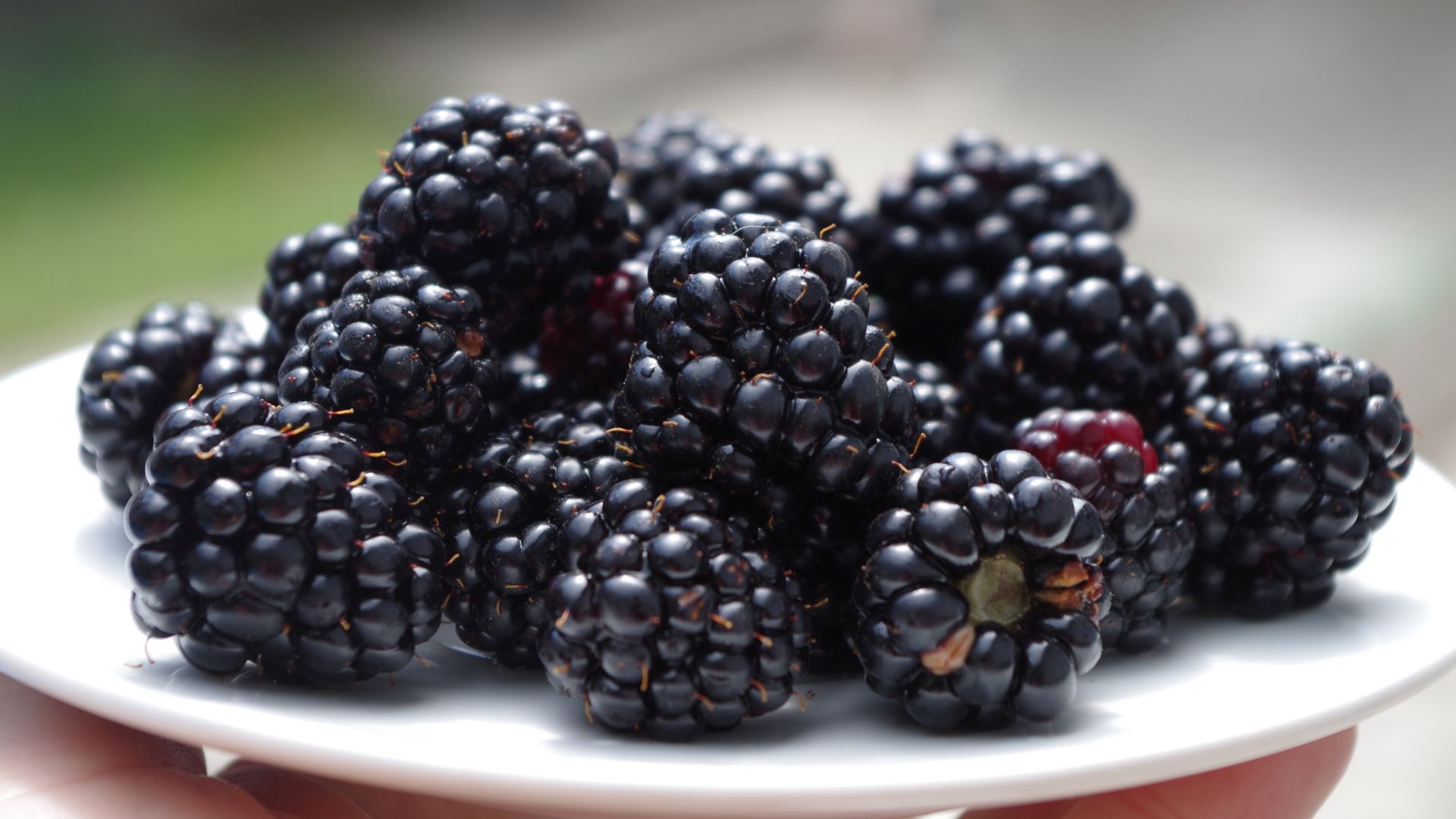The Health Benefits Of Blackberries
Feb 15, 2025
I make a mean blackberry crumble if I do say so myself. Blackberries (Rubus fruticosus) are nutrient-dense berries packed with vitamins, minerals, fibre, and powerful bioactive compounds. As a rich source of polyphenols, including anthocyanins, flavonoids, and ellagic acid, blackberries have been linked to various health benefits, including cardiovascular protection, improved cognitive function, enhanced immune defence, and potential anti-cancer properties. This article provides a scientifically detailed examination of the health benefits of blackberries, focusing on their nutritional composition, antioxidant activity, gut health benefits, metabolic effects, and disease prevention potential.
Blackberries are particularly high in dietary fibre, supporting digestion and blood sugar regulation. They also contain high levels of anthocyanins, which give them their deep purple colour and contribute to their antioxidant and anti-inflammatory properties (He & Giusti, 2010).
Antioxidant and Anti-Inflammatory Properties
Blackberries contain a wide range of antioxidants, including vitamin C, flavonoids, anthocyanins, and ellagic acid. These compounds help neutralise free radicals, reducing oxidative stress and inflammation, which are key drivers of chronic diseases such as cardiovascular disease, neurodegenerative conditions, and certain cancers (Lobo et al., 2010).
Anthocyanins, the pigments responsible for the dark colour of blackberries, have been shown to modulate inflammatory pathways by inhibiting nuclear factor kappa B (NF-κB) activation, a key regulator of inflammation in the body (Del Rio et al., 2013). Additionally, ellagic acid has demonstrated potential for reducing inflammation and protecting cells from DNA damage, which may lower the risk of cancer development (Seeram et al., 2006).
Cardiovascular Benefits
Blackberries contribute to cardiovascular health due to their high content of polyphenols, fibre, and potassium. The anthocyanins in blackberries have been linked to improved endothelial function, reduced arterial stiffness, and lower blood pressure (Miller & Snyder, 2012).
The soluble fibre in blackberries helps lower LDL cholesterol levels by binding to bile acids and promoting their excretion, reducing the risk of atherosclerosis and coronary artery disease (Brown et al., 1999). Additionally, potassium supports blood pressure regulation by counteracting the effects of sodium, promoting vascular relaxation, and reducing hypertension risk (He & MacGregor, 2008).
Blood Sugar Regulation and Metabolic Health
Blackberries have a low glycaemic index and are rich in dietary fibre, which helps slow glucose absorption and prevent postprandial blood sugar spikes. The polyphenols in blackberries, particularly anthocyanins, have been shown to enhance insulin sensitivity and improve glucose metabolism, making them beneficial for individuals with type 2 diabetes (Khan et al., 2014).
Furthermore, the ellagic acid in blackberries has demonstrated potential to modulate carbohydrate digestion and absorption, reducing the glycaemic impact of meals and supporting metabolic health (Pereira et al., 2020).
Cognitive Function and Neuroprotection
The polyphenolic compounds in blackberries, particularly anthocyanins and flavonoids, have been shown to have neuroprotective effects. These compounds help reduce oxidative stress and inflammation in the brain, supporting cognitive function and reducing the risk of neurodegenerative diseases such as Alzheimer’s and Parkinson’s (Joseph et al., 2009).
Research suggests that regular consumption of flavonoid-rich foods, such as blackberries, is associated with improved memory, learning ability, and overall cognitive function due to their role in enhancing neuronal signalling and protecting against neuroinflammation (Spencer, 2010).
Gut Health and Prebiotic Benefits
Blackberries are an excellent source of dietary fibre, which supports digestive health by promoting bowel regularity and preventing constipation. The fibre in blackberries provides a substrate for beneficial gut bacteria, promoting a healthy gut microbiome and supporting overall digestive function (Slavin, 2013).
Additionally, polyphenols found in blackberries act as prebiotics, enhancing the growth of beneficial bacteria such as Bifidobacteria and Lactobacilli, which play a crucial role in immune modulation and gut barrier function (Gibson et al., 2017). The combination of fibre and polyphenols in blackberries may also help reduce inflammation in the gut, lowering the risk of conditions such as inflammatory bowel disease (IBD) and irritable bowel syndrome (IBS).
Immune System Support
Blackberries contain high levels of vitamin C, which plays a crucial role in supporting the immune system. Vitamin C enhances the production of white blood cells, strengthens the skin’s barrier against pathogens, and acts as an antioxidant to protect immune cells from oxidative stress (Carr & Maggini, 2017).
Additionally, flavonoids and anthocyanins in blackberries have demonstrated antimicrobial and antiviral properties, which may help enhance immune defence against infections (Williamson et al., 2021).
Potential Anti-Cancer Properties
Blackberries have been extensively studied for their potential role in cancer prevention. Their high content of anthocyanins, ellagic acid, and flavonoids contributes to their anti-cancer properties by inhibiting tumour growth, inducing apoptosis in cancer cells, and reducing inflammation (Seeram et al., 2006).
Ellagic acid, in particular, has been shown to block the activity of certain enzymes involved in cancer cell proliferation, particularly in colorectal and breast cancer models (Khan et al., 2014). The antioxidant properties of blackberries also help protect DNA from oxidative damage, further reducing cancer risk.
Bone Health and Nutrient Absorption
Blackberries provide essential minerals such as calcium, magnesium, and vitamin K, which contribute to bone health and skeletal integrity. Vitamin K is crucial for bone metabolism and calcium regulation, reducing the risk of osteoporosis and fractures (Booth, 2012).
Additionally, the polyphenols in blackberries may enhance calcium absorption and bone mineral density, further supporting long-term skeletal health (New et al., 2016).
Nutritional Composition of Blackberries
A 100g serving of raw blackberries provides:
-
Energy: 43 kcal
-
Carbohydrates: 9.6g (including 5.3g dietary fibre and 4.9g sugar)
-
Protein: 1.4g
-
Fat: 0.5g
-
Vitamin C: 21mg (23% of the recommended daily intake, RDI)
-
Vitamin K: 19.8μg (22% RDI)
-
Folate: 25μg (6% RDI)
-
Potassium: 162mg (5% RDI)
-
Calcium: 29mg (3% RDI)
-
Magnesium: 20mg (5% RDI)
-
Anthocyanins and flavonoids: Present in significant amounts
Conclusion
Blackberries are a highly nutritious fruit with a wide range of health benefits. Their high content of antioxidants, polyphenols, and fibre contributes to cardiovascular protection, cognitive support, immune enhancement, metabolic health, and potential cancer prevention. Regular consumption of blackberries as part of a balanced diet can promote overall well-being and reduce the risk of chronic diseases.
References
-
Booth, S.L., 2012. Vitamin K: food composition and dietary intakes. Food & Nutrition Research, 56, p.5505.
-
Carr, A.C. & Maggini, S., 2017. Vitamin C and immune function. Nutrients, 9(11), p.1211.
-
Gibson, G.R., et al., 2017. The role of prebiotics in gut health. Nature Reviews Gastroenterology & Hepatology, 14(8), pp.491-502.
-
Seeram, N.P., et al., 2006. Blackberry anthocyanins inhibit tumour growth. The Journal of Nutritional Biochemistry, 17(2), pp.99-106.
-
Spencer, J.P., 2010. The impact of flavonoids on memory. The Journal of Nutrition, 140(6), pp.1362S-1365S.




